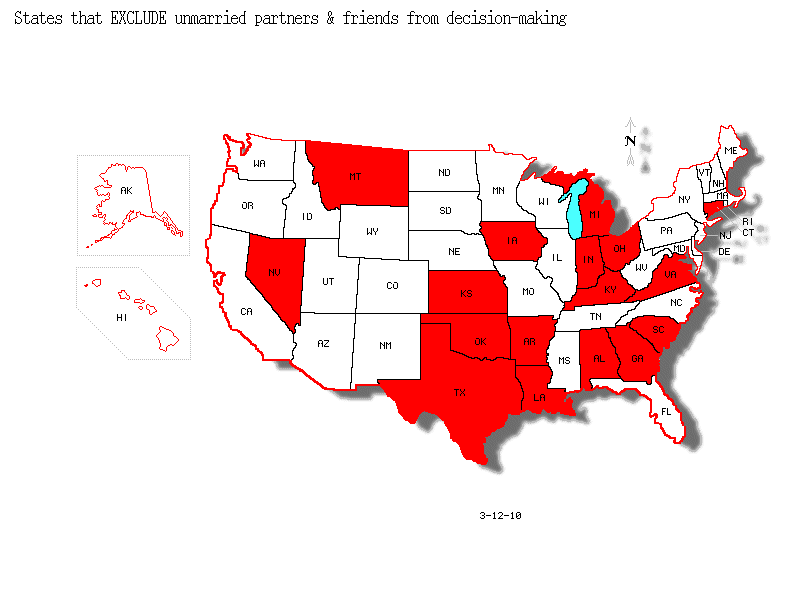Medical Decision Making and Hospital Visitation are often in the news, and often portrayed as if they depend on marriage. Get the facts and take action here!
Quiz: Have you protected your hospital rights?
- Have you asked your doctor or lawyer for information and blank forms? (You can also find blank forms on the web.)
- Do you know who you want to make health care decisions for you, and what general kinds of treatment you want (especially regarding end-of-life care)?
- Did you tell your chosen proxy about your wishes?
- Did you complete all the important forms?
- Do your primary care doctor and your chosen proxy have official copies of your health care documents?
If you’ve done it all, congratulations! Encourage people you know to protect their rights.
What are your medical decision-making rights?
Every American has the right to decide how to handle their emergency and end of life care. Our society values caretaking and autonomy; it is a moral imperative to protect these ideals in our health care law. The federal Patient Self Determination Act (PSDA) requires all Medicaid and Medicare providers (nearly every hospital, nursing home, hospice program, home health agency, and HMO) to educate adult patients, at the time of in-patient admission or enrollment, about their rights under state laws governing advance directives. However, hospitals and doctors rarely educate patients about their options.
If an incapacitated patient has not completely documented his or her wishes, hospitals follow state laws about who can make health care decisions for the patient. Many states rank potential decision makers and mandate that hospitals follow this priority order. In most states, a domestic partner or close friend is last on the list of potential proxies. In some states, domestic partners and close friends are not on the list at all.
Don’t let the state pick who will make decisions about your medical treatment. Complete your documents today!
Still don’t want to deal with the paperwork? If you don’t have an advance directive, and you happen to be hospitalized in any of the states shown in RED, doctors can only consult people related to you by blood, adoption or marriage. To see the exact law in your state, visit the American Bar Association chart (which we used to make this map).

What are your hospital visitation rights?
Effective January 18th, 2011: “A hospital [that takes Medicare or Medicaid payments] must have written policies and procedures regarding the visitation rights of patients, including those setting forth any clinically necessary or reasonable restriction or limitation that the hospital may need to place on such rights and the reasons for the clinical restriction or limitation. A hospital must meet the following requirements: (1) Inform each patient (or support person, where appropriate) of his or her visitation rights, including any clinical restriction or limitation on such rights, when he or she is informed of his or her other rights under this section. (2) Inform each patient (or support person, where appropriate) of the right, subject to his or her consent, to receive the visitors whom he or she designates, including, but not limited to, a spouse, a domestic partner (including a same-sex domestic partner), another family member, or a friend, and his or her right to withdraw or deny such consent at any time. (3) Not restrict, limit, or otherwise deny visitation privileges on the basis of race, color, national origin, religion, sex, gender identity, sexual orientation, or disability. (4) Ensure that all visitors enjoy full and equal visitation privileges consistent with patient preferences.”
Definitions: What are the documents?
Before you take steps to ensure your end-of-life care you should be familiar with the current terminology. The rhetoric used to describe the same documents varies from website to website and from state to state. Use this list of terms as a checklist:
- Advance Directive (also known as “health care directive”): a pair of documents (durable power of attorney and living will) stating your wishes for medical care as well as whom you designate to make health care decisions for you when you become incapacitated.
- Living Will: a contract between you and your doctor expressing your wishes for medical care should you become incapacitated. Also, your doctor must honor this document should you transfer medical facilities while incapacitated.
- Durable Power of Attorney for Health Care: in this document you appoint the person you choose to make medical decisions on your behalf when you become incapacitated. The person whom you designate to speak for you is referred to as your “proxy”, or “attorney-in-fact”, or “agent” depending on what state you live in.
- Hospital Visitation Form: this form is usually not included in an advance directive. Athough most hospitals are covered by the federal rule quoted above, some other medical facilities like hospices might not be following the same rule.
- Other Names Used for Advance Directives: Medical Directive, Directive to Physicians, Declaration Regarding Health Care, Designation of Health Care Surrogate or Patient Advocate Designation
How to Take Action
You can do this, and you can do it today! Read about other people who did it.
The documents are straightforward and do not require a lawyer to fill out. Several websites provide explanations and copies of forms. We like the format at Caring Connections.
If your state does not have a specific visitation form, you can write a simple one yourself, based on this sample.


